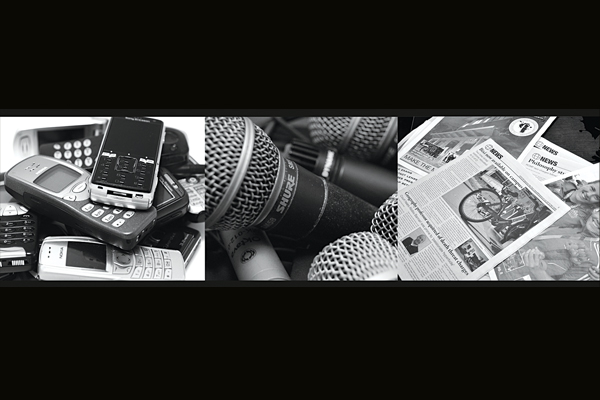Thank god it’s Monday, and other lies
All through high school, my dad used to say, “If you work hard for these four years, you won’t have to for the rest of your life.” Maybe university had slipped his mind because when he helped me unload my things into my dorm room in first year, he said the same thing.
He expressed similar sentiments when I told him I wanted to switch career paths from diplomacy to journalism. The industry might be tough, he said, but if you outwork everyone at the beginning, you’ll make it in the end.
But where does that end? When do you reach that promise-land of not working until you drop? For many millennials, not only is the land-of-adequate-work-effort nothing more than a mirage, it’s considered — or at least, advertised to be — undesirable. Work itself has become not just a means, but an end.
This is hustle culture, and it’s become a prominent lifestyle for Canadian youth. Like many North American trends, it’s as impressive as it is troubling.
The productivity paradox
I had a roommate in my first year of university who was the offspring of two high-powered corporate executives, and her idea of a social gathering was cocktail parties and networking events. It had been since she was 16 years old.
She was always shaking somebody’s hand. My high school experience, which consisted largely of bush parties and playing hooky, was foreign to her.
While she represents an extreme, she is a perfect example of the archetype that hustle culture holds sacred. A widely circulated New York Times article calls this toil glamour, and institutions from social media to education reinforce it as the gold standard of employability.
“There is this competition; ‘I’ve got to be here all the time, or somebody else is going to eat my lunch,’ ” says Michael Leiter, professor of industrial and organizational psychology at Deakin University in Melbourne, Australia.
“If you are the star corporate lawyer or financial analyst, it isn’t necessarily that these people are a whole step more brilliant than anybody else, but they’ve got the slot right now,” says Leiter. “They’ve got that seat, and they want to hold on to it.”
He says that unlike many social issues, this is one that puts those at the top of the income scale in positions of particular vulnerability — people like my first-year roommate.
This claim is substantiated by a 2017 Statistics Canada study, which found that low-income workers tend to have lower general stress than high-income workers. But that’s not to say that anyone in pursuit of wealth or professional success can’t fall into its trap.
“A lot of the times where people are pressured to work a huge number of hours, they aren’t getting adequately compensated for those huge numbers of hours, particularly when they’re not at the very top of the income scale,” he says.
Cynthiya Rajkumar is a third-year nursing student at the University of Ottawa, and she can see a subscription to this ideology already surfacing in her peers.
“It’s almost like people think the harder you work, the greater your success, but obviously that may not be the case in every situation,” she says. “Sometimes, the harder you work, you’re just tiring yourself out more.”
The digital age has provided a vehicle for the propagandizing of hustle culture that didn’t exist before. Leiter points to dangerous subliminal messaging in the social media of high-powered CEOs and other hustle culture gurus.
“You really can’t officially say that people should work more hours than they’re being paid to work — you can’t get that from an employer, certainly not from a government spokesperson or anything like that,” he says. “But through social media, you can get these other messages.”
The idea that is being broadcast to millennials is that they can and should have it all. The only thing standing between them and unimaginable success is laziness: If only they tried harder, they could change the world. It is the production of a lifestyle, a personality, and a belief system out of pure ambition, and millennials are eating it up.
Rajkumar agrees that comparison to successful peers exacerbates these feelings of underachievement, even when students are already stretching themselves thin.
“People apply to hundreds of jobs and don’t hear back, meanwhile other people apply and get positions in ICU,” she says. “That can make you feel discouraged, especially because it feels like there’s a lot of jobs out there but there really isn’t.”
“I do know that a lot of the time when you see someone posting, and they’re doing all these social things, and they’re doing all these fun things, and you’re thinking how do you manage to stay put, do these social activities, stay involved but also do well in school? How do you manage that?”
Leiter holds that an entire culture built around professional success can have dangerous consequences.
“That kind of pressure takes away a sense of control,” he says. “You can be from the outside looking very successful, but on the inside feeling hugely under pressure that way.”
It is precisely this lack of control that is problematic, and it calls into question the sustainability of the super-worker.
The higher the climb, the farther the fall
Like many of her peers, Rajkumar has attempted to suspend her own needs in order to dedicate her time to pursuing her career. And, like many of her peers, she has experienced first-hand the crash that follows.
That’s why she started Beating Burnout, a club geared towards helping students in the nursing program avoid the trials and tribulations of toxic productivity.
“Students have a lot of pressure on them, they feel like their future is in the balance in every action that they do,” she says. “I have anxiety, and with the pressure of the program and the constant, back to back work, that’s really tricky.”
“It’s really hard to recuperate,” she adds. “It is very tricky to balance doing school but also taking care of yourself, and so it’s a matter of weighing out what could happen if you prioritize one over the other.”
In a society that is constantly evolving and a culture that pushes adaptability and material success, Rajkumar thinks young people often have to be pushed to practise simple acts of self-care, such as taking study breaks and sleeping.
She hopes Beating Burnout can address some of the barriers that stand between students and the healthy practice of ambition, such as facilitating access to career and personal counselling, while also coordinating professional events such as mentoring and networking.
Leiter has focused the majority of his research into the phenomenon of burnout — a term that is often misused, in his opinion, as a synonym for exhaustion.
“It’s a much more serious thing than just being tired,” he says. “You can be tired and still really excited about what you’re doing and really confident that you’re doing great work but you’re just so tired — that’s a very different state of mind than being tired and just cynically discouraged and hating everybody and losing complete confidence in your capacity, that’s a much more serious place to be.”
His diagnosis of burnout is contingent on several factors beyond simple workload, including autonomy, reward structure, and justice — three things fundamentally undermined by the work-for-its-own-sake mindset.
Autonomy is lost the second an employee subscribes to what Leiter describes as “the game” — the ultra-competitive work landscape that forces continual hustle by maintaining a lingering threat of replacement. Justice disappears with fair compensation for extra hours. As far as reward structure, the economy inherited by millennials threatens that, too.
“On the reward side, so many millennials now have a lot of university debt,” says Leiter. “So that ends up skimming off so much of the income off the top, which is sort of where the fun stuff happens. But paying off student debt? That’s no fun!”
Combined, the loss of these three aspects of work-life put millennials in a vulnerable place for burnout, and all of the mental and physical hardships that accompany it, which are numerous.
In fact, the World Health Organization has recently included burnout in its list of health hazards. This means that although it is not in itself considered an illness, it prompts mental and physical disorders, much like chronic unemployment.
“Performative workaholism,” a term coined by that same article New York Times article by Erin Griffith, is yet another source of mental stress in an era already characterized by rampant increases in mental health disorders. Yet millennials continue to enthusiastically bite off more than they can chew, and Leiter doubts the victims of the phenomenon will decrease in number anytime soon.
In jobs we trust
Griffith’s article suggests that the workplace has become the church of the capitalist as religion wanes as a guiding force in North American lives. Several writers have echoed this philosophy. Leiter agrees there is substance to this argument.
“Millennials bring a lot more value to their work lives,” he says. “It is taking over some of those pieces about what really is important and how do you really contribute in a meaningful way, how you make ethical decisions, that sort of thing — I think work has a bigger role in that regard.”
He cites the employer’s responsibility in intervening in situations of domestic abuse as an example of ways in which the role of the workplace has expanded to encompass aspects of employee’s personal lives in ways it didn’t before.
More than anything else, though, he thinks millennials are attracted to this lifestyle because it’s an available lifestyle.
“I think it really has become more about how the stream into regular employment situations is a bit bumpier,” he says. “I think young people particularly are worried about job security … it’s just more competitive.”
“You’ve always got to be positioned for this particular operation to fold under you or drop you or downsize around you,” he says. “You’ve got to be ready to be back on the job market and you’ve got to be able to present yourself, that’s a going concern.”
“I don’t think it’s going to go away soon, I think it’s got a lot of intrinsic momentum to it.”
Leiter says that a future in which the workplace has become the central hub of all waking life is not out of the question — a world in which all of your needs, from childcare to medical care, are under the jurisdiction of your employer.
For Rajkumar and other nursing students, this is not too far removed from reality.
“I feel like because I’m so invested in the program and I’m so passionate about helping others, that’s what sets me up to not take care of myself because I’m constantly putting other people before me,” she says. “Even if that means missing my break, I will make sure that whatever they need done is done.”
“As much as I love my passion, I can see how when you’re very invested in something, you also can kind of lose sight of taking care of yourself.”
“It would have a dark side to it as well,” agrees Leiter. “Do you really want your employer to be fully immersed in your life?”
The reality is that the glamorization of toil is already a prominent feature of pop culture and public consciousness, embodied in hashtags like #tgim (Thank God it’s Monday), tweets by high-powered CEOs, and “inspirational” quotes.
Just a few more hours. Just a few more shots of espresso. Just a few more years of unceasing work, and then your life will be set — right?




